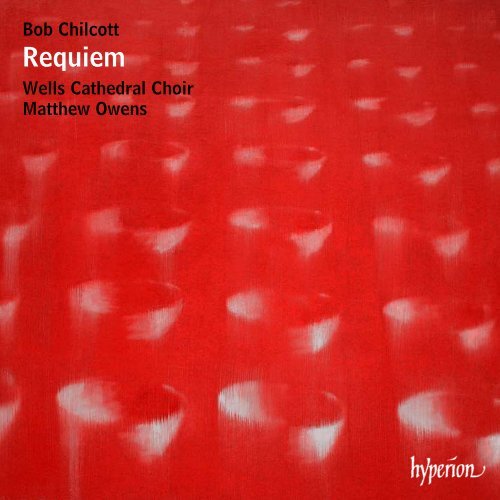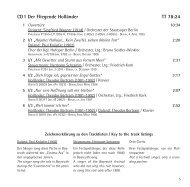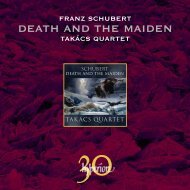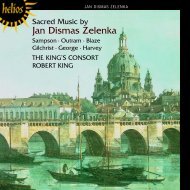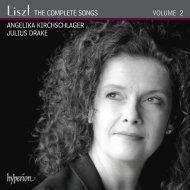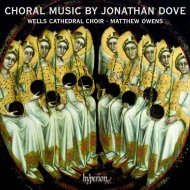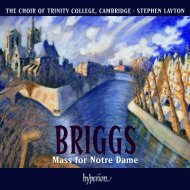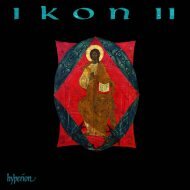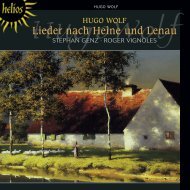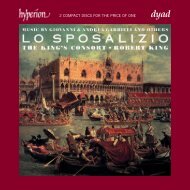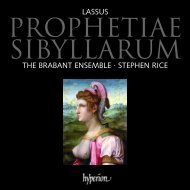Chilcott: Requiem & other works - Abeille Musique
Chilcott: Requiem & other works - Abeille Musique
Chilcott: Requiem & other works - Abeille Musique
Create successful ePaper yourself
Turn your PDF publications into a flip-book with our unique Google optimized e-Paper software.
Bob <strong>Chilcott</strong><br />
<strong>Requiem</strong><br />
Wells Cathedral Choir<br />
Matthew Owens
I T<br />
IS NOT ACADEMICALLY SOUND—but it is perhaps<br />
understandable—to suggest that Bob <strong>Chilcott</strong> was<br />
almost certain to write a <strong>Requiem</strong> at some point in his<br />
career; indeed, the portents stack up and combine so that<br />
it seems almost inevitable. To begin with, his background<br />
in church and, later, collegiate music, and the support of<br />
a church-going family, was a constant source of influence.<br />
‘My parents went to a parish church in Watford, and I sang<br />
in the choir there’, he says. ‘There were thirty-five boys in<br />
the choir—mainly because you got a free trip to the<br />
circus, and a shilling for weddings—and I absolutely loved<br />
it.’ It was here that an enlightened and generous vicar took<br />
note of <strong>Chilcott</strong>’s voice and suggested that he audition for<br />
choirboy entry to the Choir of King’s College, Cambridge.<br />
He got in, and began a relationship with the college that<br />
continued through university as a choral scholar, and<br />
eventually to twelve years as a tenor with the world-famous<br />
King’s Singers.<br />
His time as a chorister at the Choir of King’s College<br />
under Sir David Willcocks produced some of his most<br />
treasured memories. ‘We used to sing the Duruflé and<br />
Fauré <strong>Requiem</strong>s in alternate years’, he says. ‘In 1967 we<br />
recorded the Fauré, and I sang the solo in the Pie Jesu (the<br />
recording is one of the best-selling Fauré <strong>Requiem</strong>s of all<br />
time). We recorded it at Christmas and it was released very<br />
quickly, only three months later. Just before it was<br />
released, we travelled down to London to sing Holst’s<br />
Hymn of Jesus at the Royal Festival Hall, and the producer<br />
presented my m<strong>other</strong> and father with a copy of the newly<br />
pressed disc. They were so proud, and my father died only<br />
a few weeks later, so the piece has incredible resonance<br />
for me and for my family. When I came to writing my own<br />
<strong>Requiem</strong>, and the Pie Jesu in particular, it just had to be<br />
sung by a soprano solo.’<br />
For <strong>Chilcott</strong>, personal history and memories such<br />
as this are intensely important in the creation of his<br />
2<br />
compositions, as are the traditions of the Anglican church<br />
within which he sang. ‘I find that the culture you come<br />
from is extremely influential. A lot of the pieces you sing in<br />
church develop more meaning than the text alone—they<br />
come surrounded by cultural attachment. Take something<br />
like singing the psalms of the day: often the moment<br />
that you realize what a particular psalm is saying will<br />
coincide with an important part of your life elsewhere. This<br />
human angle of one’s belief is something I find incredibly<br />
motivating.’<br />
This interest in the human side of religion played a<br />
large part in one of the movements in <strong>Chilcott</strong>’s <strong>Requiem</strong>,<br />
the only movement in English: ‘Thou knowest, Lord, the<br />
secrets of our hearts’. ‘I just love that text’, he says; ‘it’s so<br />
unbelievably English. It has none of that idea of revenge,<br />
it’s just about one human saying: “Here I am, Lord, with<br />
all my faults: be decent to me.” I find that very compelling.<br />
I could never give up everything I own in the world—I<br />
freely admit that—but this text takes into account the fact<br />
that you are in the real world, with all that that means. It’s<br />
a concept that is central to my belief.’<br />
Writing a <strong>Requiem</strong> is a daunting task for any composer,<br />
particularly with so many different and evocative settings<br />
already written, and with a tantalizing yet dangerously<br />
free choice of text; comparisons—sometimes distracting,<br />
often irritating—are nevertheless inevitable. ‘I was terrified<br />
by the idea of it, but I decided that I wanted to write<br />
one’, he says. A joint commission for a large choral work<br />
from the Oxford Bach Choir, from the Preston Hollow<br />
Presbyterian Church in Dallas, and from Music at Oxford<br />
provided the catalyst, and <strong>Chilcott</strong> set about choosing his<br />
texts. ‘I wanted the piece to work liturgically and as a concert<br />
piece, and this was an influence in structuring the work.’<br />
An<strong>other</strong> influence was from that most famous of<br />
<strong>Requiem</strong>s: ‘Having sung the Fauré <strong>Requiem</strong> every <strong>other</strong><br />
year at King’s’, he says, ‘one of the things that struck me
about the work was that Fauré deliberately underplayed<br />
any of the words that define God as vengeful—the Dies<br />
irae passage lasts only sixteen bars, for example. I found<br />
that vengeful language hard to deal with. I wanted to write<br />
a contemplative setting.’<br />
<strong>Chilcott</strong>’s <strong>Requiem</strong>, which is dedicated to his niece,<br />
Samantha Verschueren, who died at the age of just twentythree<br />
while he was writing the piece, is indeed beautifully<br />
reflective. At the same time it is given focus and direction<br />
by the composer’s keen sense of melody and innate feeling<br />
for rhythm, be it the lyrical, rolling tenor solo in the Agnus<br />
Dei, or the crystal simplicity of the Pie Jesu; the gently<br />
pulsing first few bars of the Introit, or the driving, irregular<br />
beats of the Sanctus. The work’s different components<br />
develop at different paces—it is hard to put a finger on<br />
one particular moment of arrival. So the Sanctus, with its<br />
dance-like patterns, provides the dynamic peak of the<br />
<strong>Requiem</strong>; the Pie Jesu perhaps offers the emotional centre<br />
of the work; and ‘Thou knowest, Lord’, from the Book of<br />
Common Prayer, presents a central point for the text. This<br />
combination of differently paced pulses ultimately carries<br />
the listener gently through the <strong>Requiem</strong>; at once continuously<br />
moving forward while maintaining a comforting<br />
sense of reflection and stillness.<br />
<strong>Chilcott</strong>’s <strong>Requiem</strong> came hot on the heels of an<strong>other</strong>,<br />
larger-scale work: the Salisbury Vespers, which was first<br />
performed in 2009 in Salisbury Cathedral by a choir of<br />
more than 500 singers from seven different city-based<br />
choirs. ‘They realized they had a huge number of choirs<br />
who never had the chance to come together’, says <strong>Chilcott</strong>.<br />
‘At the premiere, the choirs were situated at separate<br />
points in the Cathedral—it was a difficult concept to make<br />
work, but it was very successful. The main thrust of the<br />
work was a number of large-scale psalm settings, and I<br />
interspersed these with the four motets heard on this disc.’<br />
3<br />
BOB CHILCOTT<br />
<strong>Chilcott</strong> set Marian texts suitable for different times<br />
of the year, reflecting the dedication of the Cathedral to<br />
St Mary the Virgin; each is dedicated to a different Salisbury<br />
choir. I sing of a mayden is a reflective meditation<br />
on a medieval Christmas text that shows <strong>Chilcott</strong>’s talent<br />
for the deceptively simple melody, as does the third motet,<br />
Lovely tear of lovely eye, a beautifully transparent setting<br />
of an anonymous medieval poem.<br />
When to the temple Mary went offers an<strong>other</strong> example<br />
of memories and tradition making their presence felt<br />
in <strong>Chilcott</strong>’s work: the words are the translation by the<br />
Victorian priest John Troutbeck of Johannes Eccard’s<br />
Maria wallt zum Heiligtum, a metrical setting of the<br />
presentation of Christ in the temple—the English<br />
translation still far more popular in Anglican churches<br />
than the German. The comparison with Eccard ends<br />
there, however; with its unsettling harmonies and<br />
© Vicky Alhadeff
estless temperament, this setting looks to troubled times<br />
ahead.<br />
The final motet, Hail, star of the sea most radiant,<br />
written for Salisbury Cathedral Choir, brings to the fore<br />
an<strong>other</strong> of <strong>Chilcott</strong>’s talents: a knowledge of the voice that<br />
results in an immensely joyous, natural and, above all,<br />
intensely singable outpouring of celebration that is both<br />
infectious and memorable.<br />
And so to an<strong>other</strong> centrepiece of a great Anglican<br />
tradition. <strong>Chilcott</strong>’s setting of the Magnificat and Nunc<br />
dimittis, the ‘Downing Service’, was written for the organ<br />
scholar of Downing College, Cambridge, Camilla Godlee.<br />
Unsurprisingly, it is an<strong>other</strong> text that has many memories<br />
for <strong>Chilcott</strong>. ‘At King’s’, he says, ‘as a chorister and choral<br />
scholar, there were all these new settings all the time, by<br />
composers like Robert Saxton, Gordon Crosse, Kenneth<br />
Leighton, the last of the Howells settings. Then in the<br />
1980s and ’90s there seemed to be a tailing off—apart<br />
from the odd exception: Giles Swayne and John Tavener,<br />
for instance. Now there seems to be a real renaissance<br />
of settings, which is very encouraging.’ The Magnificat<br />
is—on the surface—relatively simple, comprising just<br />
two melodic ideas, ‘but it’s actually quite tricky, as the<br />
parts are constantly changing’, says <strong>Chilcott</strong>; while the<br />
Nunc dimittis is a slow-moving, epic crescendo to the<br />
radiant words ‘a light to lighten the Gentiles: and to be the<br />
glory of thy people Israel’.<br />
4<br />
As quickly becomes apparent when one talks to <strong>Chilcott</strong>,<br />
or studies his music, the text of a piece is supremely<br />
important to him as a composer—both for its own,<br />
individual characteristics and for all the associations it<br />
holds. Sourcing them is a constant job—though there<br />
are moments when inspiration falls into one’s lap. This<br />
happened to <strong>Chilcott</strong> when he was commissioned to<br />
write a carol by Philip Brunelle, choirmaster-organist of<br />
Plymouth Congregational Church in Minneapolis. ‘Philip<br />
Brunelle supplied a poem by Kevin Crossley-Holland,<br />
which immediately inspired me. I asked for a book of<br />
his poems, and found them to be quite brilliant. In the<br />
three carols—Pilgrim Jesus, The Nine Gifts, and Jesus,<br />
springing—he has found a way of saying something that<br />
is completely fresh about a subject that is so well trodden.<br />
It doesn’t bring you back to thinking what a brilliant poet<br />
he is, it brings you back purely to the reality of the<br />
message, and I think that’s absolutely wonderful.’<br />
One of the most admirable sides to the Anglican choral<br />
tradition in which Bob <strong>Chilcott</strong>’s compositions are so<br />
deeply and lovingly steeped is an openness from congregations<br />
to new settings of Christmas carols such as these.<br />
<strong>Chilcott</strong>’s remarkable settings of these poems—indeed of<br />
all the <strong>works</strong> on this disc—contribute to a reassuringly<br />
healthy state of affairs in church music. Inspiring texts,<br />
yes; glorious music, definitely; and a combination that<br />
manages to be much more than the sum of its parts.<br />
JONATHAN WIKELEY © 2012<br />
If you have enjoyed this recording perhaps you would like a catalogue listing the many <strong>other</strong>s available on the Hyperion and Helios labels. If so,<br />
please write to Hyperion Records Ltd, PO Box 25, London SE9 1AX, England, or email us at info@hyperion-records.co.uk, and we will be pleased to<br />
send you one free of charge.<br />
The Hyperion catalogue can also be accessed on the Internet at www.hyperion-records.co.uk
<strong>Requiem</strong><br />
1 Introit & Kyrie<br />
ANDREW STAPLES solo tenor, LAURIE ASHWORTH solo soprano<br />
<strong>Requiem</strong> aeternam dona eis, Domine, Grant them eternal rest, O Lord,<br />
et lux perpetua luceat eis. and may perpetual light shine on them.<br />
Te decet hymnus Deus in Sion, Thou, O God, art praised in Sion,<br />
et tibi reddetur votum in Jerusalem. and unto thee shall a vow be performed in Jerusalem.<br />
Exaudi orationem meam. Hear my prayer.<br />
Ad te omnis caro veniet. Unto thee shall all flesh come.<br />
Kyrie eleison. Christe eleison.<br />
2 Offertorio<br />
ANDREW STAPLES solo tenor<br />
Lord have mercy. Christ have mercy.<br />
Domine Jesu Christe, Rex gloriae, Lord Jesus Christ, King of glory,<br />
libera animas omnium fidelium defunctorum deliver the souls of all the faithful departed<br />
de poenis inferni et de profundo lacu. from the pains of hell and from the bottomless pit.<br />
Libera eas de ore leonis, Deliver them from the lion’s mouth,<br />
ne absorbeat tartarus, neither let them fall into darkness<br />
ne cadant in obscurum. nor the black abyss swallow them up.<br />
Hostias et preces tibi, Domine, laudis offerimus. We offer to you this sacrifice of prayer and praise.<br />
Tu suscipe pro animabus illis, Receive it for those souls<br />
quarum hodie memoriam facimus: whom today we commemorate:<br />
fac eas, Domine, de morte transire ad vitam: allow them to cross from death into life:<br />
quam olim Abrahae promisisti et semini eius. as long ago you promised Abraham and his seed.<br />
Domine Jesu Christe, Rex gloriae, Lord Jesus Christ, King of glory,<br />
libera animas omnium fidelium defunctorum deliver the souls of all the faithful departed<br />
de poenis inferni et de profundo lacu. from the pains of hell and from the bottomless pit.<br />
Amen.<br />
3 Pie Jesu<br />
LAURIE ASHWORTH solo soprano<br />
Amen.<br />
Pie Jesu, Domine, dona eis requiem. Blessed Jesus, Lord, grant them rest.<br />
Pie Jesu, Domine, dona eis sempiternam requiem.<br />
4 Sanctus & Benedictus<br />
Blessed Jesus, Lord, grant them eternal rest.<br />
Sanctus, sanctus, sanctus Dominus Deus Sabaoth. Holy, holy, holy Lord God of Sabaoth.<br />
Pleni sunt caeli et terra gloria tua. Heaven and earth are full of thy glory.<br />
Hosanna in excelsis. Hosanna in the highest.<br />
Benedictus qui venit in nomine Domini. Blessed is he who comes in the name of the Lord.<br />
Hosanna in excelsis. Hosanna in the highest.<br />
5
5 Agnus Dei<br />
ANDREW STAPLES solo tenor<br />
Agnus Dei, qui tollis peccata mundi, dona eis requiem. Lamb of God, you take away the sins of the world, grant them rest.<br />
Agnus Dei, qui tollis peccata mundi, Lamb of God, you take away the sins of the world,<br />
dona eis sempiternam requiem. grant them eternal rest.<br />
6 Thou knowest, Lord<br />
Thou knowest, Lord, the secrets of our hearts; shut not thy merciful ears to our prayer;<br />
but spare us, Lord most holy, O God most mighty, O holy and merciful Saviour,<br />
thou most worthy Judge eternal, suffer us not, at our last hour, for any pains of death, to fall from thee.<br />
7 Lux aeterna<br />
LAURIE ASHWORTH solo soprano, ANDREW STAPLES solo tenor<br />
Lux aeterna luceat eis, Domine, Let everlasting light shine upon them, Lord,<br />
cum sanctis tuis in aeternum, quia pius es. with your saints for ever, for you are good.<br />
<strong>Requiem</strong> aeternam dona eis, Domine, Grant them eternal rest, Lord,<br />
et lux perpetua luceat eis. and let perpetual light shine upon them.<br />
Salisbury Motets<br />
8 I sing of a mayden<br />
I sing of a mayden<br />
That is makeles,<br />
King of all Kings<br />
To her son she ches.<br />
He came also stille<br />
Where his moder was,<br />
As dew in Aprille<br />
That falleth on the grass.<br />
He came also stille<br />
To his moder’s bour,<br />
As dew in Aprille<br />
That falleth on the flour.<br />
He came also stille<br />
There his moder lay,<br />
As dew in Aprille<br />
That falleth on the spray.<br />
Moder and mayden<br />
Was never none but she:<br />
Well may such a lady<br />
Goddes moder be.<br />
6<br />
9 When to the temple Mary went<br />
When to the temple Mary went,<br />
And brought the holy child,<br />
Him did the aged Simeon see,<br />
As it had been revealed.<br />
He took up Jesus in his arms<br />
And blessing God he said:<br />
In peace I now depart, my Saviour having seen,<br />
The hope of Israel, the light of men.<br />
Help now thy servants, gracious Lord,<br />
That we may ever be,<br />
As once the faithful Simeon was,<br />
Rejoicing but in thee;<br />
And when we must from earth departure take,<br />
May we gently fall asleep and with thee awake.<br />
JOHN TROUTBECK (1832–1899)
l Lovely tear of lovely eye<br />
ALFIE JOHNSON tubular bell<br />
Lovely tear of lovely eye,<br />
Why dost thou me so woe?<br />
Sorrowful tear of sorrowful eye,<br />
Thou breakest my heart in two.<br />
Thou grievest sore,<br />
Thy sorrow is more<br />
Than mankind’s mouth may tell;<br />
Thou singst of sorrow,<br />
Mankind to borrow,<br />
Out of the pit of hell.<br />
Thy m<strong>other</strong> sees<br />
What woe is to thee,<br />
And earnestly cries out;<br />
To her thou speak,<br />
Her sorrow to ease;<br />
Sweet pleading won thy heart.<br />
7<br />
Thy heart is rent,<br />
Thy body bent<br />
Upon the rood tree;<br />
The weather is passed,<br />
The devil defeated,<br />
Christ, through the might of thee.<br />
bm Hail, star of the sea most radiant<br />
Hail, star of the sea most radiant,<br />
O m<strong>other</strong> of God most glorious,<br />
A pure virgin always persevering.<br />
O gate of heaven most gorgeous,<br />
Thou was saluted with great humility<br />
When Gabriel said, Ave Maria,<br />
Establish us in peace and tranquility,<br />
And change the name of sinful Eve.<br />
Loose the prisoners from captivity.<br />
Unto the blind give sight again.<br />
Deliver us from our malignity<br />
To the end we may some grace attain.<br />
Downing Service<br />
bn Magnificat<br />
My soul doth magnify the Lord: and my spirit hath rejoiced in God my Saviour.<br />
For he hath regarded: the lowliness of his handmaiden:<br />
For behold, from henceforth: all generations shall call me blessed.<br />
For he that is mighty hath magnified me: and holy is his name.<br />
And his mercy is on them that fear him: throughout all generations.<br />
He hath shewed strength with his arm: he hath scattered the proud in the imagination of their hearts.<br />
He hath put down the mighty from their seat: and hath exalted the humble and meek.<br />
He hath filled the hungry with good things: and the rich he hath sent empty away.<br />
He remembering his mercy hath holpen his servant Israel: as he promised to our forefathers, Abraham and his seed for ever.<br />
Glory be to the Father, and to the Son, and to the Holy Ghost;<br />
As it was in the beginning, is now, and ever shall be: world without end. Amen.<br />
LUKE 1: 46–55<br />
bo Nunc dimittis<br />
Lord, now lettest thou thy servant depart in peace: according to thy word.<br />
For mine eyes have seen: thy salvation;<br />
Which thou hast prepared: before the face of all people;<br />
To be a light to lighten the Gentiles: and to be the glory of thy people Israel.
Glory be to the Father, and to the Son, and to the Holy Ghost;<br />
As it was in the beginning, is now, and ever shall be: world without end. Amen.<br />
LUKE 2: 29–32<br />
bp Pilgrim Jesus<br />
Iesus! Christus! Iesus! Natus!<br />
In the manger of my body<br />
Leaps the tiny child, and his breath<br />
Is the word—the dance of God.<br />
Corpus! Beatus! Peregrinus! Natus!<br />
In the ocean of my head<br />
The steadfast ship rides tide and storm<br />
On its pilgrim crossing.<br />
Oceanus! Peregrinus! Christus! Natus!<br />
In the orchard of my heart<br />
Springs the singing tree. Its root<br />
Is faith and its sweet fruit charity.<br />
Cor! Arbor! Amor! Christus!<br />
Riding ship, springing tree,<br />
And in the manger leaps the child<br />
Who is the word—the dance of God.<br />
KEVIN CROSSLEY-HOLLAND (b1941)<br />
© Kevin Crossley-Holland. Reproduced by permission of<br />
Enitharmon Press, under licence to Oxford University Press.<br />
bq The Nine Gifts<br />
I bring you my body, darling dear:<br />
My ripening song, my jubilant ear.<br />
That’s what Mary sang. Alleluia!<br />
And I bring surprise—this sweetest fragrance<br />
Made with love and hope in patience.<br />
That’s what Elizabeth said. Wonder!<br />
I come with a trill and a blue light<br />
And followers stumbling through the night.<br />
That’s what the star sang. Rrrrr!<br />
Well, my lamb, I’ve got you this fleece<br />
So your old m<strong>other</strong> can get some peace.<br />
That’s what the shepherd said. Yan! Tan!<br />
8<br />
I bring you the broken tooth of a giant,<br />
No compromise, the word that is silent.<br />
That’s what the stone seemed to say. ( )<br />
I bring you guffaws and loops of mist,<br />
And a band of brown hair for your right wrist.<br />
That’s what the donkey said. Eeyore!<br />
I bring you my crown and an uneasy dream<br />
Of duty and honour, gossip and scheme.<br />
That’s what the king said. Heigh-ho!<br />
Open your hand for this fitting glove:<br />
The name of the song in my throat is love.<br />
That’s what the ringdove sang. Coo-oo!<br />
But what can I bring you? I bring me.<br />
Whatever I am and all I will be.<br />
That’s what the child sang. Little Jesus!<br />
KEVIN CROSSLEY-HOLLAND (b1941)<br />
© Kevin Crossley-Holland. Reproduced by permission of<br />
Enitharmon Press, under licence to Oxford University Press.<br />
br Jesus, springing<br />
I am the heart that houses the cone,<br />
the cone enclosing the cedar,<br />
I am the cedar sawn for the cradle,<br />
forest of the body, body of the tree.<br />
I am the cradle rocking the baby,<br />
I am the baby containing the man,<br />
I am the man nailed on the cross,<br />
tree of the body, body of the forest.<br />
I am the cross sawn from the cedar,<br />
I am the cedar enclosed in the cone,<br />
I am the cone housed in the heart,<br />
here in my heart Jesus, springing.<br />
KEVIN CROSSLEY-HOLLAND (b1941)<br />
© Kevin Crossley-Holland. Reproduced by permission of<br />
Enitharmon Press, under licence to Oxford University Press.
THE CHORISTERS OF WELLS CATHEDRAL CHOIR WITH MATTHEW OWENS AND BOB CHILCOTT<br />
WELLS CATHEDRAL CHOIR<br />
boy choristers Robbie Armstrong, Oliver Buckland, Isaac Coton (Deputy Head Boy Chorister), Gabriel Donoghue, Lawrie Graham, Cassian<br />
Gray-Newton, Alfie Johnson (Head Boy Chorister), Finn Lacey, Frankie Osborne, Thomas Vaughan, Dillon Whitehead, Robbie Wills<br />
girl choristers Imogen Berry, Molly Bruce, Jordan Deans, Annabel Green (Head Girl Chorister), Mary Johnson,<br />
Suzy Kingston (Deputy Head Girl Chorister), Isabelle May, Harriet Peck, Hannah Wills<br />
Vicars Choral<br />
countertenor Timothy Angel, Simon Clulow, Stephen Harvey, Jonathan Woodhouse<br />
tenor James Butler, Edward Coton, Mark Hounsell, Iain MacLeod-Jones<br />
bass Stephen Foulkes, Andrew Mahon, Christopher Sheldrake, Jonathan Wagstaff<br />
Wells Cathedral Choir celebrated its 1100th birthday in<br />
2009: boys first sang at Wells Cathedral in 909 and the full<br />
choral tradition dates back over 800 years. In 1994 the<br />
choral foundation at Wells was enriched by the addition of<br />
girl choristers. Today the choir comprises eighteen boy<br />
choristers, eighteen girl choristers and twelve Vicars<br />
Choral. The boys and girls usually sing separately with the<br />
9<br />
Vicars Choral but occasionally come together for larger<br />
events. In 2010, in a feature on the world’s finest choirs,<br />
Gramophone rated Wells Cathedral Choir as the greatest<br />
cathedral choir in the world.<br />
The choir is at the heart of the worshipping life of the<br />
Cathedral, and sings a wide repertoire of music ranging<br />
from the masterpieces of the Renaissance period to<br />
© Iain MacLeod-Jones
the finest choral <strong>works</strong> of the present day. New music is<br />
also commissioned from some of today’s most exciting<br />
composers, including Gabriel Jackson, James MacMillan,<br />
Tarik O’Regan, Sir Peter Maxwell Davies and John Rutter.<br />
The choir broadcasts regularly, and its recordings have won<br />
international praise, with Gramophone hailing the choir<br />
as ‘one of the most impressive of today’s British cathedral<br />
choirs’ in ‘world-class form’ and making two of its recent<br />
discs Editor’s Choice. Other recordings for Hyperion include<br />
discs of Herberts Howells (CDA67494), Kenneth<br />
Leighton (CDA67641), William Mathias (CDA67740),<br />
Jonathan Dove (CDA67768) and James MacMillan<br />
(CDA67867).<br />
MATTHEW OWENS is Organist and Master of the Choristers<br />
of Wells Cathedral, having previously been Organist<br />
and Master of the Music at St Mary’s Episcopal Cathedral,<br />
Edinburgh, Sub Organist of Manchester Cathedral, Tutor<br />
in Organ Studies at the Royal Northern College of Music,<br />
Assistant Conductor of the National Youth Choir of Great<br />
Britain, and conductor of The Exon Singers. He is also<br />
conductor of the Wells Cathedral Oratorio Society and<br />
President of the Cathedral Organists’ Association. Born<br />
in 1971 he studied at Chetham’s School of Music, The<br />
Queen’s College, Oxford, the Royal Northern College of<br />
Music and the Sweelinck Conservatorium, Amsterdam. He<br />
is in demand for choral <strong>works</strong>hops and masterclasses in<br />
the UK and abroad, and has made over twenty-five CDs as<br />
a conductor or solo organist. He has championed new<br />
music, particularly of British composers, premiering<br />
many new <strong>works</strong> ranging from Jools Holland to James<br />
MacMillan, and John Rutter to Sir Peter Maxwell Davies.<br />
JONATHAN VAUGHN is Assistant Organist at Wells<br />
Cathedral, a post he took up in September 2007. While at<br />
school he was Organ Scholar at Croydon Parish Church<br />
10<br />
and while still sixteen had gained both diplomas of the<br />
Royal College of Organists, winning a number of prizes.<br />
After a gap year as Organ Scholar at St George’s Chapel,<br />
Windsor Castle, Jonathan spent four years as Organ<br />
Scholar and later Assistant Organist at St John’s College,<br />
Cambridge, while studying the organ with Dame Gillian<br />
Weir. Particular highlights of his time at St John’s included<br />
performing on critically acclaimed recordings of Lennox<br />
Berkeley and Edward Elgar for Naxos’s English Choral<br />
Music series. After leaving Cambridge, Jonathan spent<br />
three years as Assistant Director of Music at St<br />
Edmundsbury Cathedral, where he was also Director of<br />
the St Edmundsbury Singers. He performs frequently as<br />
a recitalist at venues across the United Kingdom.<br />
THE NASH ENSEMBLE has built up a remarkable reputation<br />
as one of Britain’s finest ensembles, and, through<br />
the dedication of its founder and artistic director Amelia<br />
Freedman and the calibre of its players, has gained a<br />
similar reputation all over the world. The repertoire is vast,<br />
and the imaginative, innovative and unusual programmes<br />
are as finely architectured as the beautiful Nash terraces<br />
in London from which the group takes its name. Not that<br />
The Nash Ensemble is classically restricted; it performs<br />
with equal sensitivity and musicality <strong>works</strong> from Mozart to<br />
the avant-garde. Indeed, it is one of the major contributors<br />
towards the recognition and promotion of many leading<br />
composers through first performances to date of over<br />
265 new <strong>works</strong>, including 165 commissions of pieces<br />
especially written for the ensemble, providing a legacy<br />
for generations to come. The ensemble has won The<br />
Edinburgh Festival Critics’ music award ‘for general<br />
artistic excellence’, and in 1989 and 2002 The Royal<br />
Philharmonic Society’s small ensemble award ‘for the<br />
breadth of its taste and its immaculate performance of a<br />
wide range of music’.
LAURIE ASHWORTH was born in Wigan, Lancashire. She<br />
studied at the Royal Northern College of Music, where she<br />
won numerous prizes including the RNCM Gold Medal,<br />
the college’s highest award for performance. In 2008 she<br />
completed her Masters at the Royal College of Music,<br />
where she studied with Patricia Rozario and Janis Kelly.<br />
Since being a finalist and runner-up in BBC Radio 2’s The<br />
Kiri Prize—a nationwide search by Dame Kiri Te Kanawa<br />
and the BBC to find a new operatic star—Laurie has<br />
made numerous appearances on BBC2’s Friday Night is<br />
Music Night. She has also appeared with Opera Project,<br />
Opéra de Dijon, Grange Park Opera and Wexford Festival<br />
Opera.<br />
11<br />
ANDREW STAPLES sang as a chorister in St Paul’s<br />
Cathedral before winning a Choral Scholarship to King’s<br />
College Cambridge, where he gained a degree in Music.<br />
Andrew was the first recipient of the RCM Peter Pears<br />
Scholarship, sponsored by the Britten–Pears Foundation,<br />
at the Royal College of Music and subsequently joined the<br />
Benjamin Britten International Opera School. He studies<br />
with Ryland Davies. In concert he has sung under Sir<br />
Simon Rattle, Daniel Harding, Andrew Manze, Yannick<br />
Nézet-Séguin and Semyon Bychkov. He has also appeared<br />
at the Royal Opera House as Jacquino (Fidelio), returning<br />
as First Armed Man (Die Zauberflöte), Artabanes (Arne’s<br />
Artaxerxes) and Narraboth (Salome).<br />
Recorded in The Cathedral Church of St Andrew in Wells, Somerset, on 25–26 May & 21–22 June 2011, by kind permission of The Chapter<br />
Recording Engineer JULIAN MILLARD<br />
Recording Producer MARK BROWN<br />
Booklet Editor TIM PARRY<br />
Executive Producer SIMON PERRY<br />
P & C Hyperion Records Ltd, London, MMXII<br />
Front illustration: Bowls by Charlie Baird (b1955)<br />
All Hyperion and Helios recordings may be purchased over the internet at<br />
www.hyperion-records.co.uk<br />
where you will also find an up-to-date catalogue listing and much additional information<br />
Copyright subsists in all Hyperion recordings and it is illegal to copy them, in whole or in part, for any purpose whatsoever, without<br />
permission from the copyright holder, Hyperion Records Ltd, PO Box 25, London SE9 1AX, England. Any unauthorized copying<br />
or re-recording, broadcasting, or public performance of this or any <strong>other</strong> Hyperion recording will constitute an infringement of<br />
copyright. Applications for a public performance licence should be sent to Phonographic Performance Ltd, 1 Upper James Street,<br />
London W1F 9DE
BOB CHILCOTT<br />
(b1955)<br />
<strong>Requiem</strong><br />
& <strong>other</strong> <strong>works</strong><br />
WELLS CATHEDRAL CHOIR<br />
*soprano LAURIE ASHWORTH<br />
*tenor ANDREW STAPLES<br />
* THE NASH ENSEMBLE<br />
flute PHILIPPA DAVIES<br />
oboe GARETH HULSE<br />
clarinet RICHARD HOSFORD<br />
horn LAURENCE DAVIES<br />
timpani CHRIS BRANNICK<br />
†organ JONATHAN VAUGHN<br />
conductor MATTHEW OWENS<br />
<strong>Requiem</strong> *† 2010 [41'49]<br />
1 Introit & Kyrie [9'27]<br />
2 Offertorio [7'48]<br />
3 Pie Jesu [6'02]<br />
4 Sanctus & Benedictus [2'13]<br />
5 Agnus Dei [5'00]<br />
6 Thou knowest, Lord [5'03]<br />
7 Lux aeterna [6'11]<br />
Salisbury Motets 2009 [17'56]<br />
8 I sing of a mayden † [4'06]<br />
9 When to the temple Mary went [4'39]<br />
bl Lovely tear of lovely eye † [6'09]<br />
bm Hail, star of the sea most radiant [3'00]<br />
Downing Service † 2009 [7'23]<br />
bn Magnificat [2'49]<br />
bo Nunc dimittis [4'33]<br />
bp Pilgrim Jesus 2010 [2'12]<br />
bq The Nine Gifts † 2010 [4'25]<br />
br Jesus, springing † 2010 [5'50]<br />
all first recordings<br />
CDA67650
CHILCOTT REQUIEM Hyperion<br />
WELLS CATHEDRAL CHOIR / MATTHEW OWENS CDA67650<br />
Bob <strong>Chilcott</strong><br />
(b1955)<br />
<strong>Requiem</strong> *† [41'49]<br />
1 Introit & Kyrie [9'27] 2 Offertorio [7'48] 3 Pie Jesu [6'02] 4 Sanctus & Benedictus [2'13]<br />
5 Agnus Dei [5'00] 6 Thou knowest, Lord [5'03] 7 Lux aeterna [6'11]<br />
Salisbury Motets [17'56]<br />
8 I sing of a mayden † [4'06] 9 When to the temple Mary went [4'39]<br />
bl Lovely tear of lovely eye † [6'09] bm Hail, star of the sea most radiant [3'00]<br />
bn Downing Service † [7'23]<br />
bp Pilgrim Jesus [2'12] bq The Nine Gifts † [4'25]<br />
br Jesus, springing † [5'50]<br />
all first recordings<br />
WELLS CATHEDRAL CHOIR<br />
LAURIE ASHWORTH soprano * ANDREW STAPLES tenor *<br />
THE NASH ENSEMBLE *<br />
JONATHAN VAUGHN organ †<br />
MATTHEW OWENS conductor<br />
MADE IN FRANCE<br />
www.hyperion-records.co.uk<br />
HYPERION RECORDS LIMITED . LONDON . ENGLAND<br />
CDA67650<br />
Duration 79'39<br />
DDD<br />
CHILCOTT REQUIEM Hyperion<br />
WELLS CATHEDRAL CHOIR / MATTHEW OWENS CDA67650


